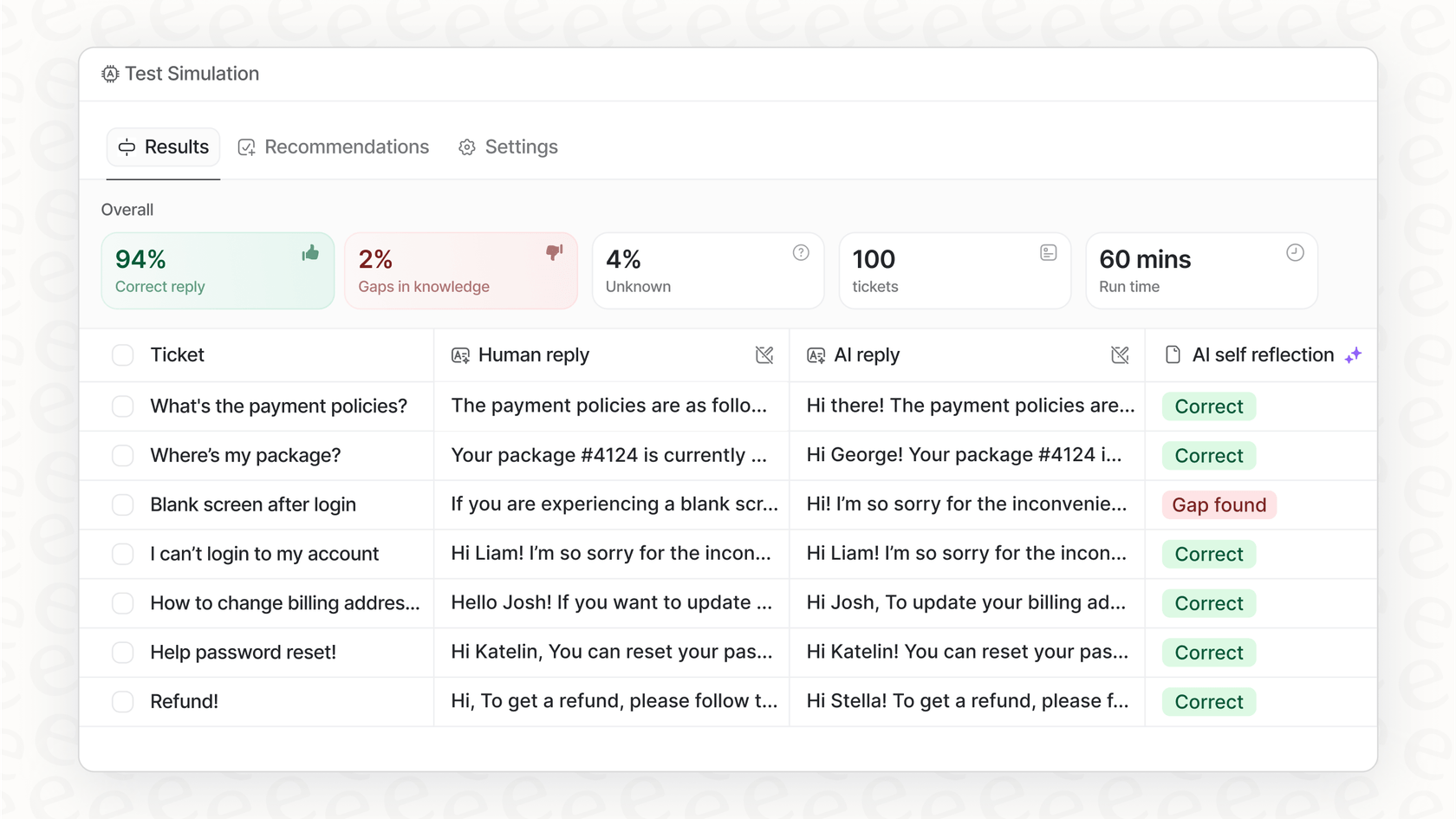
Picking an AI platform to help with customer support or manage all your internal knowledge feels like a huge decision. The name IBM Watson probably keeps popping up in your search. It has decades of brand recognition and a reputation for being an enterprise-grade solution. But in a world where AI changes by the minute, is it still the best choice for a modern business?
This guide is here to give you the real story. We're going to dig into actual Watson AI reviews from places like G2, Gartner, and Reddit to give you a clear, straightforward picture of its strengths, weaknesses, and what it really costs. Our goal is to help you figure out if Watson is the right tool for your team, or if a more modern, flexible solution might be a better fit.
What is IBM Watson, really? A quick breakdown
Alright, first things first, let's clear up what "Watson" actually is these days. It isn't one single product. It’s a whole suite of AI services built for businesses, which is a long way from the machine that won Jeopardy all those years ago. Unlike tools you might use every day like ChatGPT, Watson is made specifically for big business use cases, a point that comes up a lot in user reviews.
When we're talking about customer support and knowledge management, you'll mainly be dealing with a couple of key parts of the Watson family:
-
Watson Discovery: Think of this as an AI-powered search engine on steroids. It's designed to dig through massive amounts of documents and data to pull out insights.
-
Watson Assistant: This is the platform for building chatbots and virtual agents to answer customer questions.
-
watsonx.ai: This is the big workshop where developers can build, train, and launch their own custom AI models.
Watson is really aimed at large companies, often in industries with a lot of regulations, that have plenty of tech resources and sometimes need to run software on their own servers. Keeping this in mind is key to understanding the user reviews we're about to get into.
What the Watson AI reviews actually say
A company's website will tell you all the amazing things a product is supposed to do. User reviews tell you what it’s actually like to live with it every day. After digging through the feedback on Watson, a few distinct patterns started to show up.
The positives: Niche power for enterprise search
To be fair, Watson has its fans, especially when it comes to heavy-duty data analysis. Many positive Watson AI reviews give it credit for its powerful Natural Language Processing (NLP). Users on G2 praise its knack for "extracting insights from unstructured data" that would be impossible to find any other way.
This makes it a solid choice for very specific, large-scale projects. For instance, HSBC used Watson Discovery to help create an AI-powered index fund, and Woodside Energy sifted through 30 years of documents to save expert knowledge from being lost. For companies with gigantic, messy datasets and the engineering team to tame them, Watson can deliver real value. Its security features and ability to be deployed on-premise also make it appealing for industries that have to worry a lot about compliance.
The challenges: A pattern of complexity, cost, and poor usability
But for every glowing review about a massive project, there are a lot more from people who are struggling with the day-to-day reality. The negative feedback tends to circle back to the same few problems:
-
It's just plain complicated. A common complaint across G2 and Gartner is the "complexity of setup, requiring technical expertise." It’s not something you can just switch on; getting it running is a major IT project that takes time and effort.
-
The user experience is rough. The folks on Reddit don't mince words, with some calling it "borderline unusable" for the average person and a "complete joke." One user shared a story that says it all: their company's internal Watson bot, when asked a simple question about sick days, could only respond with, "contact HR." It really shows the gap between what's promised and how it actually performs on basic tasks.
-
It feels rigid and slow. Users also say the platform can feel sluggish and inflexible compared to newer tools. One reviewer even worried, "I wouldn’t be surprised if we are overall slower" than their competitors because of it.
For any team that doesn't have dedicated AI engineers on standby, this level of complexity can be a dealbreaker. It’s a huge contrast to modern platforms like eesel AI, which are built to be self-serve from the ground up. You can connect it to your helpdesk and knowledge bases in minutes, not months, and start testing how the AI would perform on your past tickets right away, no code required.
What reviews reveal about IBM Watson's pricing
Let's talk about money. Trying to figure out Watson's pricing is... an adventure. It’s a confusing tangle of subscription levels, pay-as-you-go fees, and custom enterprise deals that are hard to get a straight answer on.
The starting costs are steep. The Watson Discovery "Plus" plan kicks off at $500 a month and the "Enterprise" plan starts at $5,000 a month, and both have limits on how many documents you can use. The watsonx.ai platform often has a monthly base fee plus charges for every million tokens you use, which makes it almost impossible to predict your monthly bill.
| Service | Plan Type | Starting Price | Key Limitation |
|---|---|---|---|
| Watson Discovery | Plus Plan | $500 / month | Capped at 10,000 documents |
| Watson Discovery | Enterprise | $5,000 / month | Capped at 100,000 documents |
| watsonx.ai | Essentials | Pay-as-you-go | Billed per million tokens, hard to predict |
| watsonx.ai | Standard | $1,050 / month | Base fee + pay-as-you-go usage |
And that's just the sticker price. What the reviews bring up again and again are the "hidden costs." This includes expensive consultants needed to get it set up, ongoing maintenance, and extra fees for integrations and customizations. These extra costs can easily end up being two or three times more than the software license itself.
This unpredictable pricing can make budgeting a nightmare. It’s where the transparent, flat-fee pricing of a tool like eesel AI feels like a breath of fresh air. You know exactly what you’re paying each month, with no extra charges per ticket resolved. You can scale up your support automation without sweating over a surprise bill at the end of the month.
A simpler, more integrated alternative for modern support teams
The Watson AI reviews paint a pretty clear picture: it's a powerful platform, but it feels like it was designed for a different era of enterprise software, one that was complex, expensive, and walled-off. If you're a support team that needs to move fast and stay flexible, you're probably looking for something different.
eesel AI was built to solve the very problems that systems like Watson often create. Instead of a long, drawn-out implementation project, it gives you:
-
Instant integration: You can connect it to the tools you already rely on, like Zendesk, Confluence, and Slack, with just a click.
-
Unified knowledge: eesel AI automatically learns from all your company's information, including your past support tickets, so it understands your business's unique quirks from day one.
-
Risk-free rollout: It has a powerful simulation mode that lets you test the AI on thousands of your real, historical tickets. You can see exactly how many tickets it would have resolved and tweak its performance before it ever talks to a single customer. It gives you total confidence before you go live.

Is IBM Watson the right choice in 2025?
So, what's the bottom line? Based on the reviews, IBM Watson can still be a decent choice for huge companies with deep pockets, a dedicated tech team, and a specific need for a highly customized, on-premise AI solution.
For most other businesses, though, the user feedback is pretty telling: the high cost, overwhelming complexity, and clunky experience can make it a frustrating choice that might create more headaches than it solves. The world of AI has moved on, and today's best platforms are all about speed, flexibility, and being easy to use.
Before you commit to a legacy system, it's worth asking yourself: do you need a complicated science project, or do you need a practical tool that will start helping your support team right away?
This video explores whether IBM Watson is still a major player in the AI landscape of 2025, comparing it with modern alternatives like ChatGPT.
Get started with an AI platform that just works
If you’re leaning towards a tool that you can set up in minutes, not months, maybe it's time to see what that looks like. Try eesel AI for free and see for yourself how quickly you can automate support, deflect tickets, and give your agents the answers they need, all with clear pricing and no hidden fees.
Frequently asked questions
Watson AI reviews frequently highlight its significant complexity. Many users report that setting up and managing IBM Watson requires substantial technical expertise and dedicated IT resources, making it challenging for teams without specialized AI engineers.
Watson AI reviews reveal a complex and often unpredictable pricing model, involving steep base fees and usage-based charges. Users often point out significant "hidden costs" for consultants, ongoing maintenance, and integrations, which can inflate the total investment.
Watson AI reviews praise its powerful Natural Language Processing (NLP) capabilities, especially for extracting insights from massive, unstructured datasets. Its security features and on-premise deployment options are also valued by large, regulated enterprises.
While capable, Watson AI reviews often note challenges in using it for straightforward customer support. Users report that getting Watson Assistant to handle common queries effectively can be complex and may require extensive customization, sometimes leading to basic answers.
Watson AI reviews largely suggest that IBM Watson is best suited for large enterprises with substantial budgets and dedicated technical teams. For most small to medium-sized businesses, its complexity and high costs often make it an impractical choice.
Watson AI reviews frequently cite frustrations related to the lengthy and complex implementation process. Users report that getting the system operational is a major IT project, requiring significant time and effort, rather than a quick setup.
Share this post

Article by
Stevia Putri
Stevia Putri is a marketing generalist at eesel AI, where she helps turn powerful AI tools into stories that resonate. She’s driven by curiosity, clarity, and the human side of technology.






